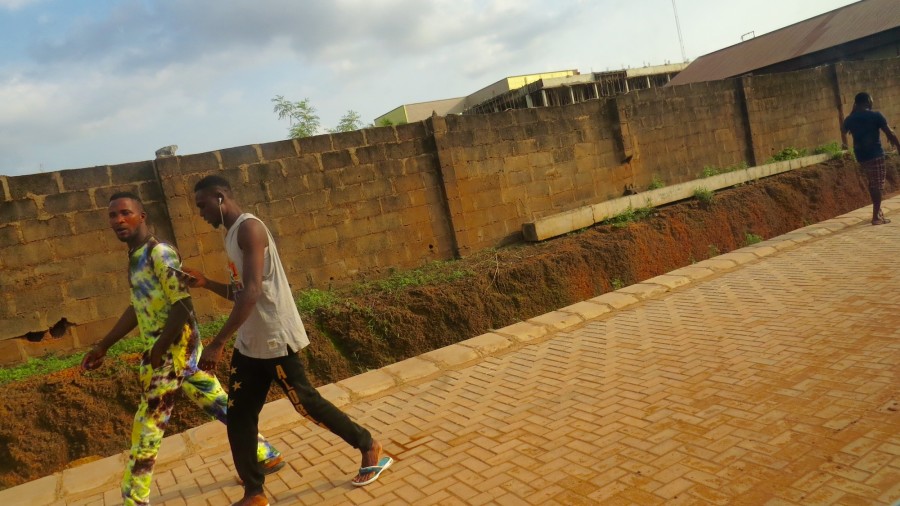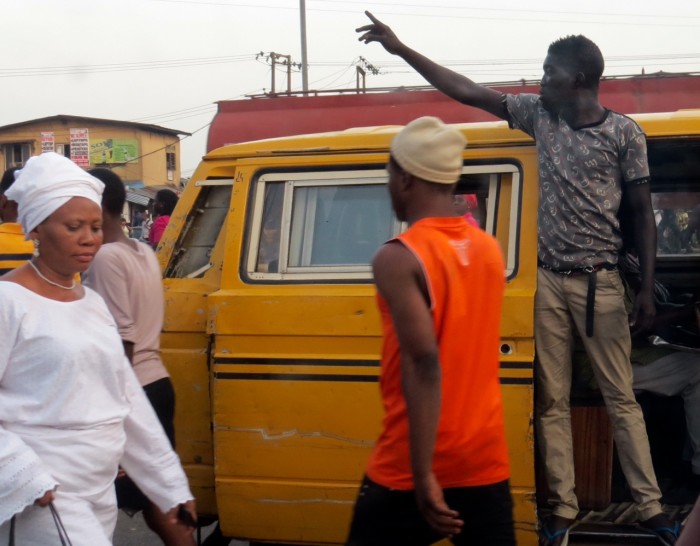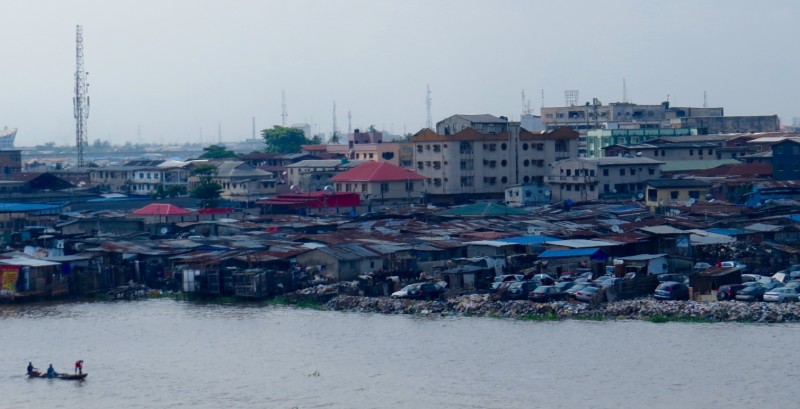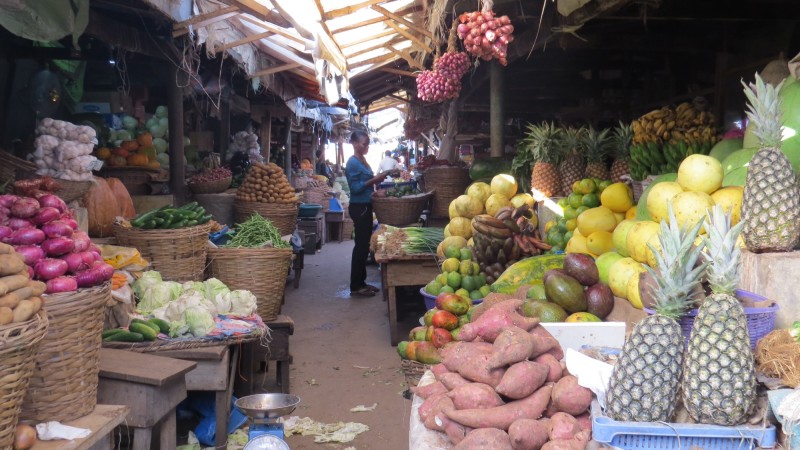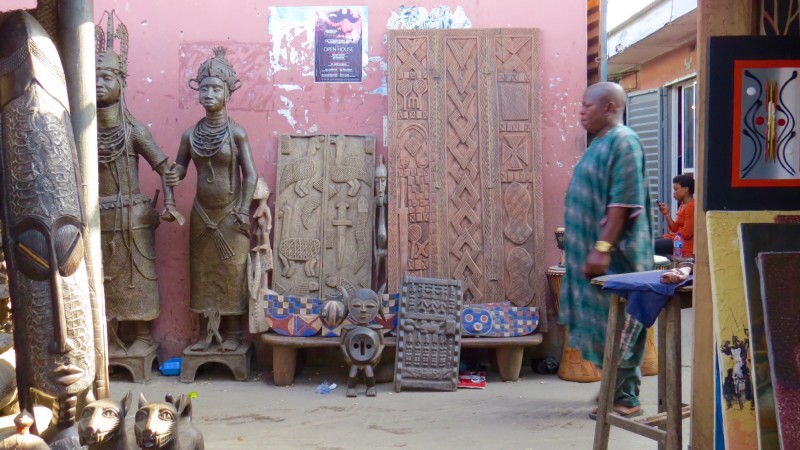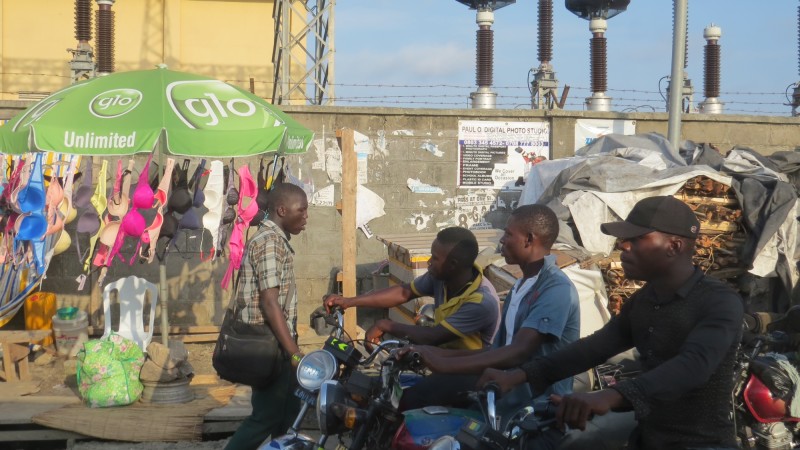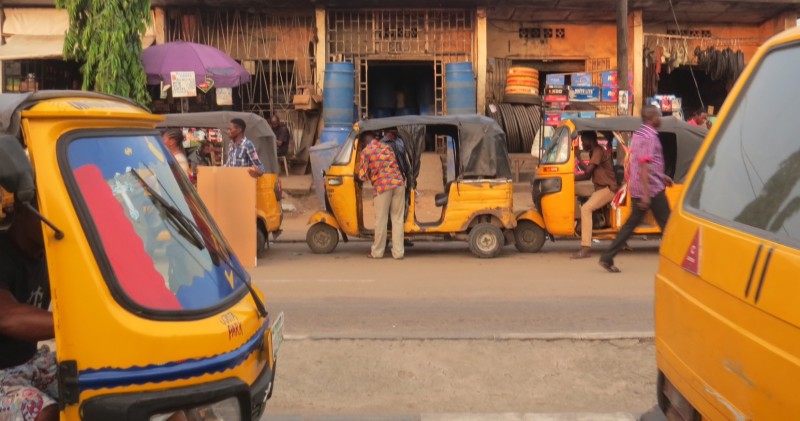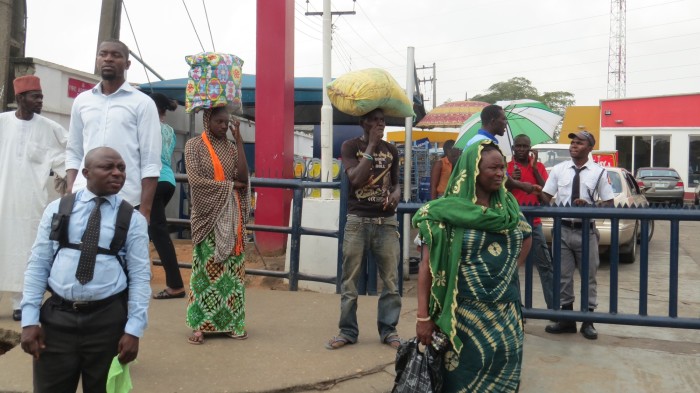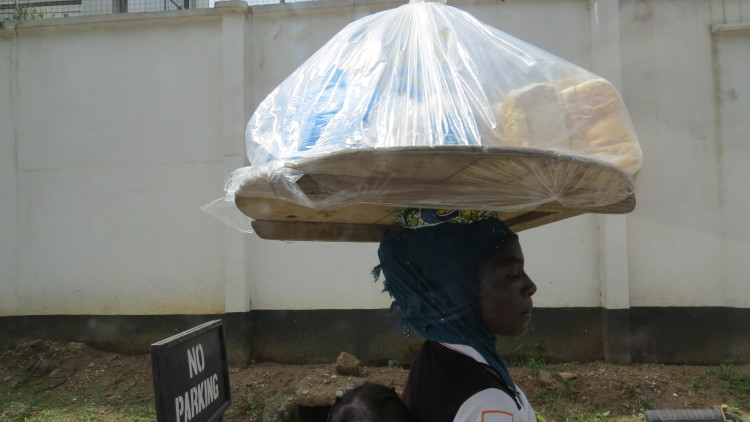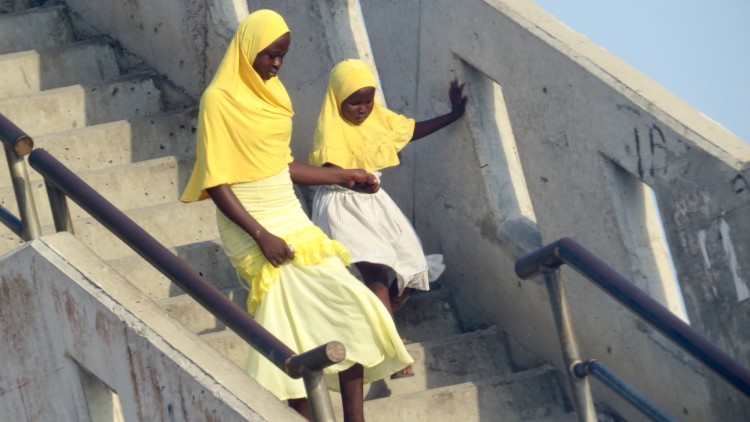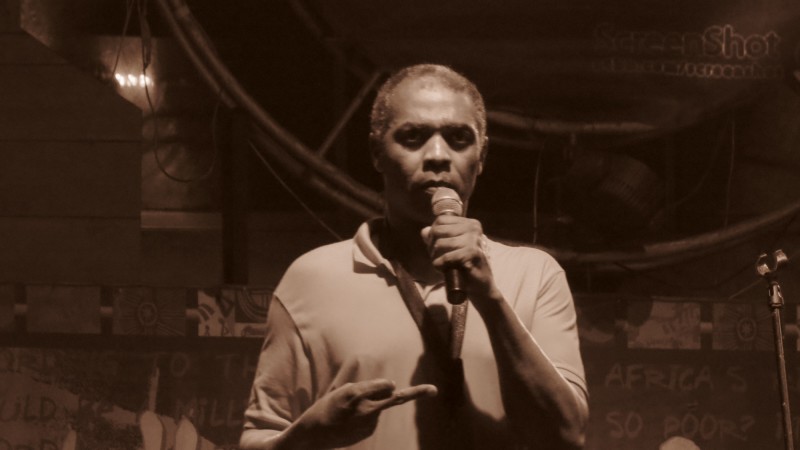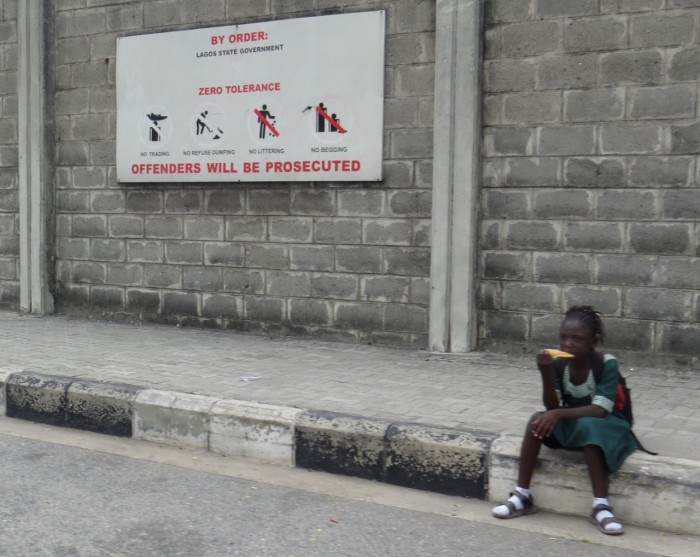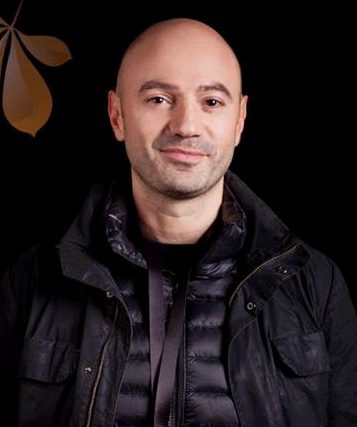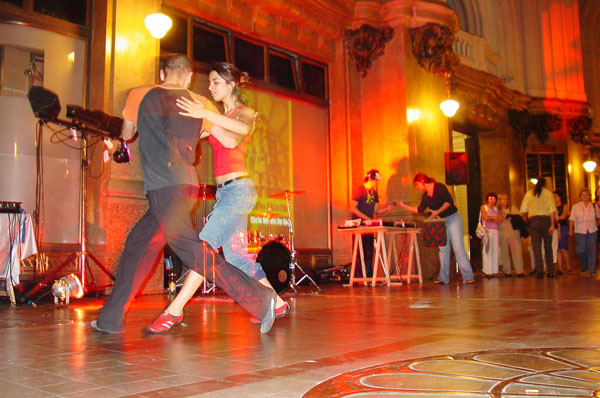A Lagos State of Mind…
By Maurice Caldera
Maurice Caldera is a British screenwriter/director. He was one of the writers selected by the British Council to participate in the Script Junction programme, a cultural exchange between a small group of Nigerian and British screenwriters. The first leg of the programme was in Edinburgh, the second and final leg was in Lagos where all the writers pitched their films at the African Film Festival. Below are his thoughts on his first trip to Sub-Saharan Africa's largest city.
DAY 1 SATURDAY NIGHT
As the UK Script Junction team slowly emerges one by one from the cafes and shops and aisles of Boots the chemist of Terminal 3, I learn the news that we’ve lost two of the other writers. Matthew Jankes and Russell Davidson unfortunately can’t make the trip, which is a shame as I was looking forward to getting to know them better.
Jennifer Majka, Sam Firth, Shola Amoo and myself are all here and present, along with Wendy Mitchell who is co-ordinating the whole project and the UK tutors Lorianne Hall and Rob Ritchie.
So we’ve been revving up for this moment since the first Script Junction workshop in Edinburgh, and here we are on the plane to Lagos and it looks to me like we’re not going anywhere. There’s a guy three rows behind who’s screaming the place down. Turns out that he’s being deported back to Nigeria, and he doesn’t want to be cuffed and he doesn’t a particular officer sitting next to him. Just as it looks like the stand off is about to get violent, they relent. The man is un-cuffed, the officer sits elsewhere, the plane takes off and we never hear another word out of him. Except that I couldn’t help thinking of this man on a plane with 200 of his countrymen free to come and go as they please, and he, very different, yet exactly the same.
Six hours and a few movies later we’re in a hot and humid Lagos.
DAY 2 SUNDAY
At Lagos airport we wait forever for our luggage to arrive, and then a van with an armed escort (yup, that’s right, a man with a gun) takes us to the Sheraton, a big old 1970s hotel with all the funky elegance of the time, Africa style (think Last King of Scotland). But before we get in through the door, there’s even more security. We, along with everyone else, will be searched and checked and screened every time we enter the hotel, or any other place for that matter.
The breakfast buffet looks more like dinner, fish stew, meat stew, prawn rice, fried rice, fried plantain, and a gloopy yoghurt like thing called ogi which I am told is delicious, but it’s neither sweet nor salty, and I just don’t get it.
After a snooze we get back in the van and head along Sub Saharan Africa’s longest bridge to Victoria Island, our faces pressed against the window getting our first glimpses (and snaps) of Lagos life. It’s messy and it’s vibrant and it’s colourful. As we cross the bridge, we see the floating slums of Lagos, and the clouds of steam and smoke that they send into the air. It is a strange sight we will see with every crossing.
At an arts centre called Terra Kulture, we meet the lovely British council team and have our security briefing. The gist of it is this…in Lagos we’ll be able to do what we like, within reason, as long as a man with a gun escorts us there and back.
We’re at Terra Kulture for the theatre and the food, but we happen on an incredible exhibition of paintings by Emenike Ogwo, a well known Nigerian artist, who depicts Lagos scenes with thick layers of oil paint.
The main event is a play called Band Aid, a musical comedy about a group of musicians trying to break into the industry, written by our fellow Script Junction writer Abiodun Kassim. The play is great fun. It manages to move from comedy to music to drama and back again without stopping for breath. And as for the audience…well, more of Nigerian audiences later.
DAY 3 - MONDAY
We’re reunited with the Nigerian writer/filmmakers at breakfast and then head to Afrinolly studios. Just as we’re about to start the workshops, we lose two more of the UK contingent. This time it’s the side effects of the anti-malaria tablets. Back in London the nurse told me that the pills might (at worst) make my dreams more vivid, which to a writer is not at all unappetizing. The two Brits staring into the bottom of their respective toilet bowls might want to add a few more side effects to that list.
That afternoon we experience our first proper encounter with the infamous Lagos traffic. We’re heading to see the world premiere of our Script junction colleague’s CJ Obasi’s film O-Town as part of the AFRIFF (African International Film Festival). In Lagos nothing ever starts on time, except that this time it does, and CJ is 20 minutes late to his own premiere.
O-Town is a bag of tricks of a film, a tongue in cheek gangster homage to CJ’s hometown of Owerri. It’s a packed house, the response seems positive and CJ could not be happier.
OK…so now let me tell you about Nigerian audiences…they talk and text and take calls and make calls during the film, they heckle the actors and if there is a song they know, they sing along. I had a girl on my right who did not stop talking on her phone the whole time, and a girl on my left whose running commentary ran all the way to the finish line. For a guy who doesn’t tolerate the least bit of plastic wrapper rustling in cinemas I think I did good, in fact it was strangely liberating.
DAY 4 – TUESDAY
Day three and it feels more like week three, and I mean that in a good way. It’s a packed schedule in a pretty intense place and even if we’re just stuck in traffic it’s still Lagos traffic.
Today the workshops begin in earnest at the hotel. We divide into three groups and discuss the scripts that we have all been working on for the last few months. I am teamed in group led by Ishaku Dashon, who seems to bring out my garrulous side, and I can’t stop talking. It’s all constructive stuff, but I just can’t shut up.
Given that we were all a little whiney in Edinburgh when we were told we’d have to actually write a script, we’ve all done pretty well in getting them written, even if it was gently(ish) pointed out to us that the typo count was off the scale in some instances.
Pearl Osibu (who blogged on Script Junction from Edinburgh) and I are taken off to the Afrinolly studios to be interviewed on camera about our feelings about Script Junction. As usual I think of the perfect answer about an hour later, when we’re stuck in traffic heading back to the hotel…it didn’t help that the guy interviewing me was yawning the whole time I was speaking.
What I should have said is something that CJ Obasi said to me. He said that we in the UK have a lot to learn from Nigerian filmmakers who just make their films, unlike us who have to wait for some guy in an office (his words) to give us a thumbs up. Though he also said that they had a lot to learn from the UK in terms of technical ability, something that is patently obvious when you watch Nigerian films.
What is true is that being around these filmmakers and their energy is inspiring.
DAY 5 – WEDNESDAY
There’s a general feeling amongst all of us that we should avoid wasting time in traffic unless we have to, and so the workshops continue by the pool at the Sheraton (it’s hot and humid and that water is tempting but we soldier on!).
For me, the notes I get from all tutors are pretty much spot on and will serve the basis for the next draft. In Edinburgh my big question was how do I tell this story? And that was answered. In Lagos, the question is, how do I continue with this story? And that too is answered.
After lunch a few of us head over to Lekki market. We are given a crash course by Anike from the British Council on bartering. Her advice is to offer a third of what they offer you and stay around that price. We all take this advice with varying results, though the stuff there is beautiful and it’s cheap.
Anike is efficiency personified. She is from the east of her country, but was born in here in Lagos, which is in the West. She tells me that in Nigeria you come from the place where your father comes from, even if you’ve never been there, that’s where you’re from.
After sweating it out at the hot, covered market we end up at the flashy Eko hotel which is party/conference central. The smartly dressed Nigerian crowd puts our own #stickyfromthemarket crowd to shame. In fact, it was so hot and humid that Sam Firth’s shoes begin to disintegrate there and then…they just peel away, leaving a trail of black gunge all over the shiny floor of the hotel, from the table where we are sat to the buffet and back.
By the time the other Script Junction participants arrive, we’re all feeling a bit like Sam’s shoes. Time for shower and bed.
DAY 6 THURSDAY
In Edinburgh the Nigerian contingent complained about the food, especially the sandwiches. Now I know why. One of the writers, Nicolette Ndigwe explained that in Nigeria you breakfast like a king, lunch like a prince and dine like a beggar, but to me it seems that everyone’s appetite is equally regal at night as it is in the day. The food is rich, often spicy and generally quite heavy. The pounded yam that you accompany with stews (and eat with your fingers) is like a giant gnocchi. My favourite is Jollof rice, which is a spiced rice, and pepper soup, a spicy soup, with either fish, chicken or oxtail broth.
Today we spend the day working on our pitches, and all that food sits a little heavily with all those mounting butterflies.
Over dinner at the hotel, we talk languages and tribes. Nigeria is a very ethnically and culturally diverse country. When Nigerians meet, they will immediately identify who is from what tribe, from either speech or appearance or just tribal radar. Although most Nigerians speak English, they also speak their own language, which they may dip in and out depending on who they’re with. It’s fascinating.
And then it’s time to head to the New Afrika Shrine, Fela Kuti’s Club. It’s a huge warehouse full of men sitting at tables, puffing on a lot of weed, watching Fela do his thing with his incredible band on one side and female dancers on the other, who swing and shake and twerk in ways that seem impossible.
Like his father, Fela Kuti Jr is very political. He sermonizes on everything from corruption, to the troubles in Biafra, to the English colonials who imposed this contrivance on a nation known as Nigeria. And having had the conversation at dinner, it’s hard to disagree on that point, though as guests of the British council, we squirm a little in our seats.
DAY FRIDAY
It’s the last day and we are all muttering our pitches to ourselves over breakfast and over the long, long wait for the van that is taking us to the venue.
When the van finally arrives, it initially makes good progress, and then things begin to go wrong…the van starts to make some very worrying noises. The noises become weirder and more problematic until the van slows to a crawl. It looks like we’re going to be dropped off in the middle of nowhere, but the van somehow manages to crawl to the shopping mall.
We deliver our pitches before a panel and if that wasn’t scary enough, we have a full house of an audience. Despite our nerves, I think that we all put on a great show. Our stories are varied in tone and location and theme. In the end the panel come back and name Abiodun Kassim’s pitch as their favourite, with a special mention for Kenneth Gyang’s. But I think we’re all pretty pleased with ourselves.
After the pitch, I had a few Nigerian producers offer to make my kidnap drama here in Nigeria. For a moment I get swept up in the emotion of the day, but as a stark reminder of filmmaking in Nigeria, we attend a screening of the closing film Road to Yesterday, co-written by our own Emil Garuba. It’s an interesting story with a great twist which the audience seems to respond well to, but the filmmaking itself feels a little basic. Above all it’s the acting that seems strangely distant and low-key. For a country that is so expressive and vibrant, this does not make sense to me.
We head to a place called Yellow Chile for dinner. This is the last time that we all be together. Lorianne Hall makes an emotional speech about how this trip will stay with her forever. We all get a little choked up because we all feel the same. From day one, we all clicked as a group, we shared our stories and supported each other, and we are taking something very special and very precious from this experience.
The next morning we’re up at dawn and back in Blighty in time for tea, and already missing the Jollof rice.
FΩRMIdea London, 20th February 2015.
Other article on African cinema: Africa finds its cinematic voice
